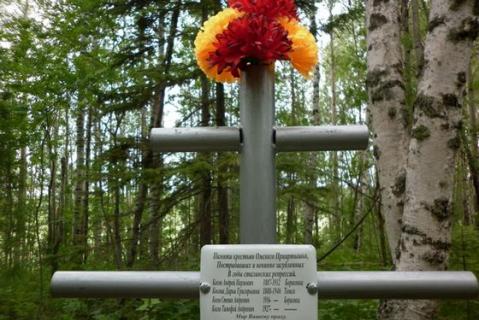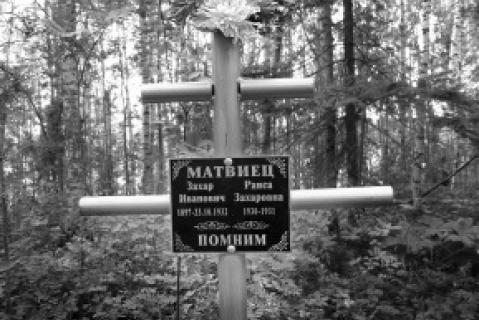The Borisovka special settlement for dekulakized peasant families from the Omsk Region’s Poltavsky district was set up in the Kargasoksky district in 1931. Deported Soviet Germans and forced settlers from Moldavia were sent here in 1941. The men, women and children who died in Borisovka were buried in mass and individual graves in the graveyard not far from the settlement.
In summer 2007, the area was studied by an expedition of the Kargasoksky district’s “Forgiveness and Memory” local history group. Expedition members erected a commemorative cross at the site of the special settlement, with the words “Never forget those innocent victims who suffered during the Stalinist repression” on an attached board.
In 2011, three descendants of the dekulakized families who were sent to Borisovka from Siberia (Ye.F. Kel, V.F. Kel and I.I. Kosov) visited the area and erected crosses where the graveyard is supposed to have been. These commemorate members of the Kosov and Matviyets families. “In memory of peasants from the Irtysh area of the Omsk Region, who suffered and were unjustly ruined during the years of Stalinist repression: Andrei N. Kosov, 1887-1932, d. Borisovka; Darya G. Kosova, 1886-1946, d. Tomsk; Stepan A. Kosov, 1916-? d. Borisovka; and Timofei A. Kosov, 1927-? d. Borisovka. May You Rest in Peace! From your grateful descendants” reads the plaque on one cross. That on another says, “Zakhar I. Matviets, 1897 to 23 October 1932 and Raisa Zakharovna [Matviyets], 1928-1931. We remember”.
The Memorial online database (2025) lists 217,732 victims in the Tomsk Region. See Mount Kashtak.
It includes 197,129 names from police records. 146,154 from other parts of the USSR (over 100,000 from the Altai Republic and Siberian Regions – Novosibirsk, Omsk, Krasnoyarsk and Kemerovo) were sent to Tomsk; many victims were subsequently born there (38,293).
This total includes 23,011 Soviet Germans, over half convicted in 1941; 117,816 of the earlier deportees were listed as “kulaks”. Police record the deaths of 18,464 deportees: more than 12,000 of them had been sent to the Tomsk Region as “dekulakised peasants” in the early 1930s (police records include other members of the Kel and Matviets families). 743 Germans are recorded as having died between the 1930s and 1950s.
| Date | Nature of ceremonies | Organiser or responsible person | Participants | Frequency |
|---|---|---|---|---|
|
nk
|
Commemorative Services
|
nk
|
nk
|
From time to time
|
| State of burials | Area | Boundaries |
|---|---|---|
|
have not survived
|
not determined
|
not delineated
|
[ Original texts & hyperlinks ]
“Chronicle of the ‘Forgiveness and Memory’ project, 2007”, unofficial website about Kargasik district and its inhabitants, 1 August 2010 [retrieved, 10 January 2025]
“Commemorative signs in Borisovka village”, website of Tomsk Memorial museum “the NKVD investigative prison” [retrieved, 10 January 2025]


